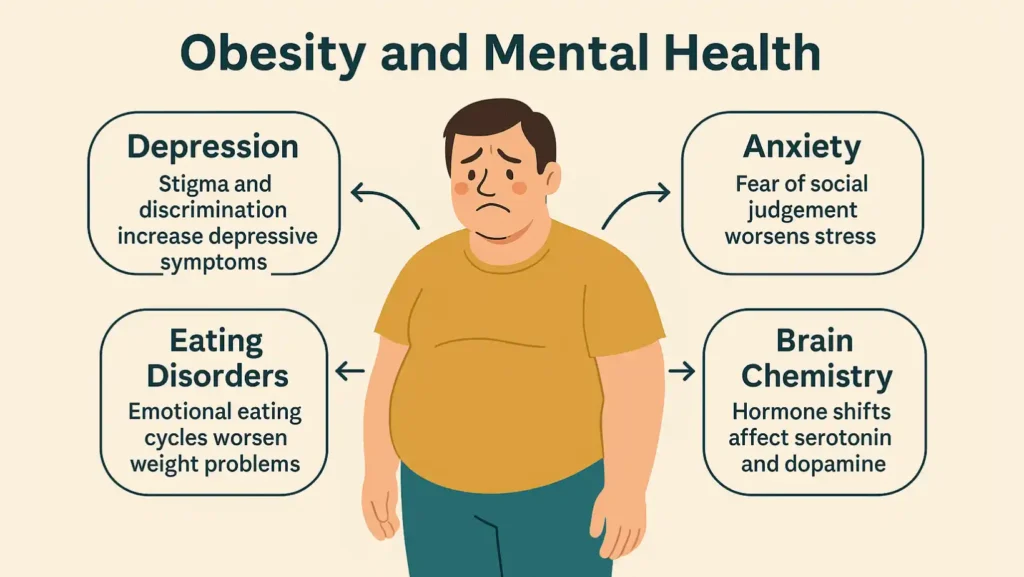How does obesity affect the body? The answer is wide and complex because obesity is not just about extra weight. It is a health condition that alters nearly every system in the body.
Table of Contents
ToggleFrom the brain to the joints, fat tissues affect hormones, blood flow, and organ function. Over time, this leads to several obesity health complications that can reduce life expectancy and quality of life.
This article explores each system in detail with science-backed insights, simple explanations, and examples to help you understand the true effects of obesity on health.
Nervous System and Brain Health
The brain is highly sensitive to body fat. Research shows that excess fat tissue releases chemical signals that can cross into the brain and disturb nerve pathways. This process can trigger low-grade inflammation, which damages brain cells over time.
- Memory and Learning: Adults with obesity often experience slower memory recall. Studies suggest that brain regions responsible for learning shrink in size when obesity persists for years.
- Stroke Risk: Obesity raises blood clot risk, which increases chances of stroke. Stroke can cause permanent brain damage.
- Mental Processing: Brain imaging shows slower communication between neurons in people with obesity compared to people with normal BMI.
This explains why one of the most concerning effects of obesity on health is its long-term impact on brain health.
Respiratory System and Breathing Issues
Carrying extra weight presses against the diaphragm and chest cavity, making it harder for the lungs to expand. Over time, this creates multiple breathing issues.
- Sleep Apnea: The most common breathing problem linked to obesity. People with sleep apnea stop breathing for seconds during sleep. This lowers oxygen supply and raises blood pressure.
- Asthma Worsening: Asthma symptoms often worsen with obesity because fat tissue promotes airway inflammation.
- Reduced Lung Volume: Extra fat in the belly pushes against the lungs, reducing air volume. This leads to breathlessness even with light activity.
These issues explain why respiratory function is a vital part of the effects of obesity physically.
Digestive System and Obesity-Related Complications
The digestive system is heavily affected by obesity. Fat stored in the abdominal cavity surrounds organs like the liver, pancreas, and intestines. This causes serious obesity and health complications.
- Fatty Liver Disease: Extra fat infiltrates the liver, leading to scarring and poor function. This is called fatty liver disease.
- Gallstones: Obesity increases bile cholesterol levels, leading to gallstones.
- Acid Reflux: Belly fat raises abdominal pressure, pushing acid back into the esophagus.
- Cancer Risk: Fat tissue in the belly raises the chance of endometrial and colon cancers.
These digestive issues are central to understanding the effects of obesity on health.
Cardiovascular System: Effects Of Obesity On The Heart
The heart is one of the most affected organs. Carrying excess weight forces it to work harder to pump blood through a larger body mass. The effects of obesity on the heart can be life-threatening.
- High Blood Pressure: Extra blood volume increases pressure on artery walls.
- Atherosclerosis: Obesity promotes plaque build-up in arteries, leading to narrowed vessels. This is a core feature of cardiovascular disease.
- Heart Failure: As the heart muscle thickens, it becomes stiff and struggles to pump efficiently.
- Stroke Risk: Blocked arteries increase stroke risk significantly.
The effects of obesity on the heart show why heart disease remains the leading cause of death in people with obesity.
Endocrine System and Chronic Diseases
The endocrine system controls hormones. Fat tissue itself acts like a hormone-producing organ. It releases signals that disturb normal balance, causing obesity and chronic diseases.
- Type 2 Diabetes: Excess fat blocks how the body responds to Insulin, leading to high blood sugar.
- Metabolic Syndrome: A cluster of conditions including belly fat, high blood sugar, high triglycerides, and low HDL cholesterol.
- Thyroid Effects: Obesity may lower thyroid hormone efficiency, slowing metabolism further.
This close link between hormones and weight explains why obesity and chronic diseases are inseparable in modern medicine.
Reproductive System And Fertility
Obesity interferes with reproductive hormones. Both men and women face challenges, making obesity and reproduction an important area of concern.
- Women: Obesity causes irregular ovulation. Reproductive health issues like polycystic ovary syndrome (PCOS) worsen with extra fat.
- Men: Testosterone levels drop, leading to poor sperm quality.
- Fertility Treatments: Obesity lowers success rates of IVF and other fertility treatments.
Obesity does not just reduce fertility but also impacts long-term reproductive system function.
Obesity And Pregnancy Complications
Pregnancy with obesity increases risks for both mother and child. Obesity in pregnancy complications are well documented.
- Gestational Diabetes: High blood sugar during pregnancy affects both mother and baby.
- Pre-eclampsia: Severe high blood pressure that threatens pregnancy safety.
- Delivery Problems: Higher risk of cesarean delivery.
- Baby Risks: Larger baby size increases delivery complications and later-life obesity risk.
Managing weight before conception greatly reduces these obesity in pregnancy complications.
Skeletal And Muscular Systems: Physical Strain
Excess weight adds load on joints and muscles. This results in painful effects of obesity physically.
- Joint Pain: Chronic knee and hip joint pain / osteoarthritis is common.
- Reduced Mobility: Extra weight limits activity, leading to weaker muscular systems.
- Spine Issues: Back pain rises due to strain on vertebral discs.
As load increases, even daily tasks can become painful, leading to reduced mobility.
Integumentary (Skin) System
The skin shows visible signs of obesity, often overlooked as minor but important.
- Acanthosis Nigricans: Darkened patches, often on the neck and armpits, signal insulin resistance.
- Stretch Marks: Skin stretches under pressure, leaving marks.
- Infections: Skin folds create warm, moist environments for fungal infections.
- Delayed Healing: Wounds heal slower in obesity due to poor blood flow.
These skin issues highlight how obesity health complications extend beyond inner organs.
Obesity And The Immune System
Fat tissue alters immune function. Chronic inflammation weakens the body’s defense.
- Infection Risk: People with obesity often take longer to recover from illness.
- Vaccine Response: Some vaccines work less effectively in obese individuals.
- Cancer Immunity: Obesity reduces immune cells’ ability to detect and kill cancer cells.
These findings explain why obesity and immune system changes are central to overall health.
Mental Health And Emotional Wellbeing
The ties between weight and mood are powerful. Obesity and mental health problems often overlap.
- Depression: Stigma and discrimination increase depressive symptoms.
- Anxiety: Fear of social judgment worsens stress.
- Eating Disorders: Emotional eating cycles worsen weight problems.
- Brain Chemistry: Hormone shifts affect serotonin and dopamine, directly linking obesity and mental health.
Without addressing both weight and mood, treatment often fails.
Other Chronic Diseases Linked To Obesity
Beyond heart disease and diabetes, obesity triggers other conditions:
- Kidney Disease: High blood pressure and diabetes together harm the Kidney.
- Cancer: Higher rates of endometrial, breast, and colon cancer.
- Stroke: Narrowed arteries increase risk of brain damage.
- Sleep Disorders: Chronic fatigue worsens daily life.
Each of these adds to the list of obesity and chronic diseases.
Takeaway: Managing The Health Risks Of Obesity
Now we see how obesity affects the body across every major system. It affects the brain, lungs, heart, liver, joints, skin, and even mood. The effects of obesity on health are not limited to appearance but span nearly every organ.
The good news is that even modest weight loss, such as 5–10% of body weight, lowers risks. Focusing on a balanced diet, physical activity, sleep, and emotional support can reverse many obesity health complications. Action taken today can protect health tomorrow.
FAQs
What are the effects of obesity on the body?
Obesity harms nearly every organ. It raises diabetes, heart disease, joint pain, cancer, and mood problems. These are the most common effects of obesity on health.
Which part of the body is affected by obesity?
All organs can be affected. Heart, liver, brain, lungs, skin, and joints are highly sensitive to excess fat storage.
Which organ is most affected by obesity?
The heart and liver show the earliest and strongest changes. The effects of obesity on heart are especially life-threatening.
What are the 5 main causes of obesity?
The main causes include high-calorie diet, lack of exercise, genetic factors, poor sleep, and certain medications. Stress also contributes.
Does obesity cause permanent damage?
Some damage like joint wear or heart strain can last. But weight loss often improves blood sugar, heart function, and mood.
Who is the most obese country?
Obesity rates vary. Current reports show the highest rates in Pacific Island nations, with the US and Middle East also ranking high.
How does obesity affect the brain?
It alters brain signals, increases inflammation, slows memory, and raises stroke risk. This shows why brain health is tied to obesity.
Who is mainly affected by obesity?
Anyone can develop obesity. Risk is higher in adults with sedentary jobs, children with poor diet, and people with family history.

This article is medically reviewed by Dr. Chandril Chugh, Board-Certified Neurologist, providing expert insights and reliable health information.
Dr. Chandril Chugh is a U.S.-trained neurologist with over a decade of experience. Known for his compassionate care, he specializes in treating neurological conditions such as migraines, epilepsy, and Parkinson’s disease. Dr. Chugh is highly regarded for his patient-centered approach and dedication to providing personalized care.









